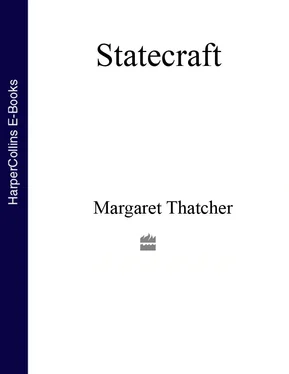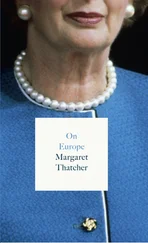The argument against the provision of loans and other aid to insolvent sovereign borrowers is well-known: it mirrors in many respects the problem involved in lending to insolvent individuals. Quite apart from whether the money will be repaid – which may not be the first consideration – such action creates what is called ‘moral hazard’. This means that it is assumed by the recipient of the aid – or by others who benefit from it indirectly, or may wish to benefit in the future – that irresponsibility will not be penalised. And that, of course, increases the likelihood of its recurring. †
Taken to its extreme, this argument would suggest a policy of rigid international non-intervention in Russia’s economic affairs. It should be said at once that this argument has its merits. Insofar as the West’s billions of dollars have helped shore up a structurally unreformed economy and a corrupt plutocracy they have done harm not good. But the fact remains that Russia is too great a potential danger to her neighbours and the world to be allowed to fail entirely. In these circumstances, the needs of politics will always tend to override the requirements of economics. The practical challenge is to ensure that intervention is correctly timed, targeted, monitored – and known to be limited. Unfortunately, with Russia this has not been the case.
Looking back, there was only a very narrow window of opportunity for the West and the IMF to act decisively. The Soviet Union was in discussions with the IMF as early as 1988. Two years later the Fund produced its recommendations for fundamental economic reform. President Gorbachev was presented with a number of possible reform programmes, but he had little understanding of economics and his preoccupations were mainly with his own and the Soviet Union’s survival. From the beginning of 1991 the Soviet administration actually moved away from political and economic reform, a course which culminated in the August 1991 putsch.
Perhaps more could have been done in this initial period. I was very keen to see Mikhail Gorbachev rewarded and encouraged. That is why I wanted to see the Soviet Union/Russia associated with the G7 economic powers, in spite of its difficulties. *I was not keen to see open-ended credits supplied, which would just build up more debt. Instead, I believed that Sir Alan Walters (my old friend and economic adviser in government) had been right to argue for the setting up of a currency board to stabilise the rouble by backing it with dollars. I also thought that Western companies might be invited to use their expertise to reform a whole sector of the collapsing Soviet system – ideally, food distribution.
Conditions changed fundamentally for the better with the accession to power of Boris Yeltsin, who immediately declared his intention to liberalise the Russian economy and brought in committed expert reformers as ministers and advisers to help him do so. The following January, price controls were removed, internal trade was freed, the rouble was floated and measures were taken to slash the huge budget deficit. But the consequences for the Russian people of this necessary programme were severe. Once the first enthusiasm for change passed it was inevitable that political pressures on the President and his team would mount. The communist-dominated parliament became the centre of resistance.
This was the point at which the West should have been generous. But it was not. Western politicians and bankers seriously misread the situation, imagining that the small print of an economic programme was more important than the political reality. By the summer of 1992 President Yeltsin had felt compelled to drop the reformist Prime Minister, Yegor Gaidar, and instal the representative of the industrial cartels, Viktor Chernomyrdin, in his place. At the same time the former chief of the Soviet Central Bank was appointed to the post of chairman of the Russian Central Bank, where he immediately set the printing presses rolling. The IMF only now agreed its first big loan to Russia – seven months after the reform programme was launched, and after the true reformers had been ousted.
For a variety of reasons, that missed opportunity never recurred. Even during the periods when economic progress seemed to be made, the underlying conditions were actually deteriorating. Politics was largely at the root of this. The struggle between the President and the parliament was waged with increasing ferocity, largely over economic policy, with Mr Yeltsin’s opponents (who had control over the Central Bank) trying to secure as strong a dose of inflationary socialism as possible. Western hopes rose, after the defeat of the parliamentary rebellion in October 1993, that the President would now be able to impose a full-blooded reform programme. To some extent, this was what happened. But the success of the communists and nationalist extremists in the parliamentary elections of December demonstrated how deep was popular disillusionment with the course proposed by the IMF. During 1994 the Chernomyrdin government pursued a policy which pushed up spending, borrowing and inflation, resulting in a collapse of the rouble in October.
Both the IMF and the Russian government now made greater efforts to agree a detailed programme of economic reform sustained by IMF financial support. The largest loan yet given to Russia – $6.8 billion – was announced on 11 April 1995. This was more than a matter of economics: it represented an investment in President Yeltsin, who faced an election in April 1996.
Mr Yeltsin won, but at what turned out to be a huge cost to himself, to Russia and to the West. First of all, he destroyed his health and could never recover his former energy and authority. Second, in order to win he made a large number of promises for extra spending which could not be afforded. Third, he had to rely on the support of Russian plutocrats whose interests lay rather in securing control over cartels in a corporatist economy than in creating a properly functioning free-market system.
For these reasons, Mr Yeltsin’s second term was a serious economic disappointment. The appointment of Anatoly Chubais and Boris Nemtsov as First Deputy Prime Ministers seemed to signal an attack on the vested interests which stood in the way of change. But it was all too late. The rouble came under pressure as a result of fall-out from the East Asian financial crisis. In March 1998, in a move intended to signal a renewed drive for reform, Yeltsin appointed a new young Prime Minister, Sergei Kiriyenko, in place of Chernomyrdin. The concentration now was on measures to increase dwindling tax revenues and defend the rouble. The international market pressure on Russia continued to intensify and the IMF together with the World Bank and Japan provided $17.1 billion of new loans.
But the market would not be bucked. In August, after $4.8 billion of the loan had disappeared across the exchanges, the rouble was devalued and then floated. It lost over half its value against the dollar in just two weeks. The Russian stock market fell by 80 per cent. Some experts estimated the rate of capital flight as at least $17 billion per year. *Money poured out of Russia, doubtless much of it ours. Russians lost, perhaps permanently, faith in their own currency.
The political consequences were not slow in coming. Mr Yeltsin’s authority was fatally weakened. Prime Minister Kiriyenko was dismissed and, after a delay in which Chernomyrdin’s reappointment was rejected by the parliament, Yevgeny Primakov, backed by the Communists, took his place. He was joined by other throwbacks to the Soviet era.
The Primakov period, which lasted until his surprise dismissal in favour of Sergei Stepashin in May 1999 – and then Vladimir Putin in August – was a time of stagnation. Economic reform in any meaningful sense was suspended. In Russia it was a time for political manoeuvring. In the West it was time for recrimination. *
Читать дальше












